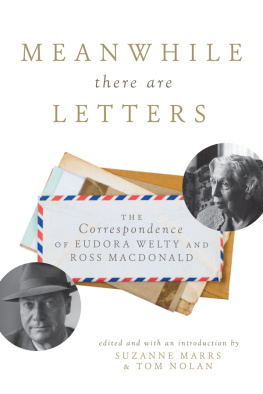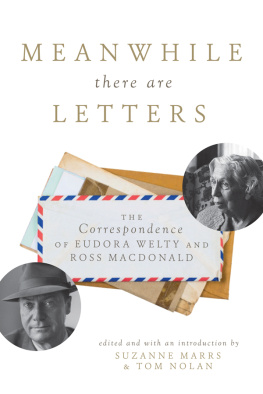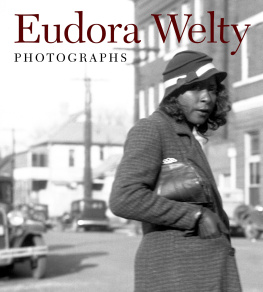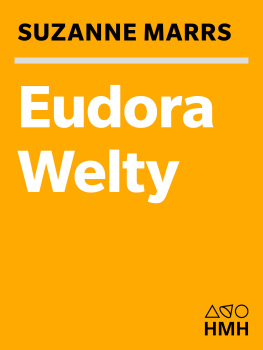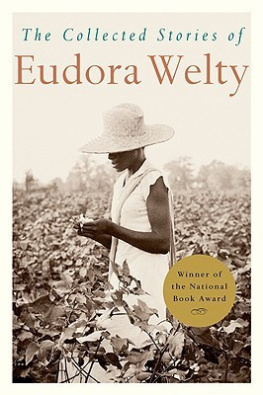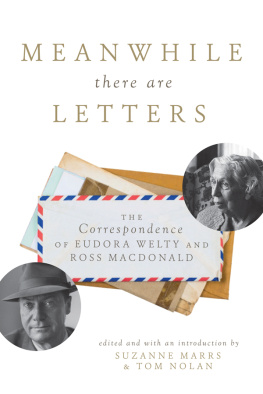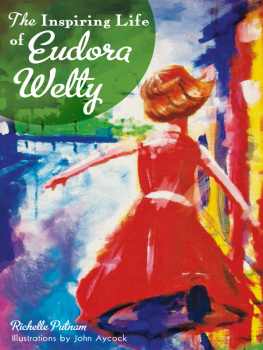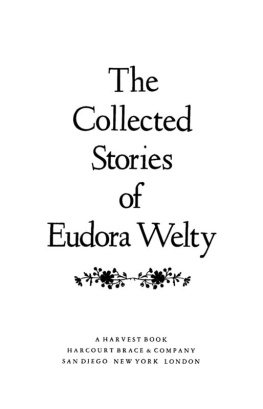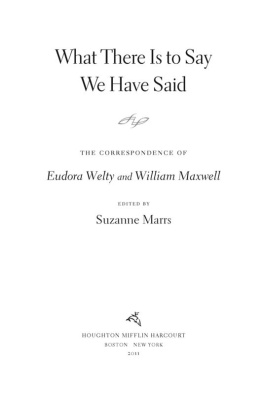Compilation, introduction, and commentary copyright 2015 by Suzanne Marrs and Tom Nolan
Correspondence copyright 2015 by Eudora Welty, LLC, and the Margaret Millar Charitable Remainder Unitrust u/a 4/12/82.
All rights reserved. No part of this book may be reproduced in any manner without the express written consent of the publisher, except in the case of brief excerpts in critical reviews or articles. All inquiries should be addressed to Arcade Publishing, 307 West 36th Street, 11th Floor, New York, NY 10018.
First Edition
Arcade Publishing books may be purchased in bulk at special discounts for sales promotion, corporate gifts, fund-raising, or educational purposes. Special editions can also be created to specifications. For details, contact the Special Sales Department, Arcade Publishing, 307 West 36th Street, 11th Floor, New York, NY 10018 or .
Arcade Publishing is a registered trademark of Skyhorse Publishing, Inc., a Delaware corporation.
Visit our website at www.arcadepub.com.
10 9 8 7 6 5 4 3 2 1
Library of Congress Cataloging-in-Publication Data
Meanwhile there are letters : the correspondence of Eudora Welty and Ross Macdonald / edited and with an introduction by Suzanne Marrs and Tom Nolan.First edition.
pages cm
Includes bibliographical references and index.
ISBN 978-1-62872-527-8 (hardback); ISBN 978-1-62872-548-3 (ebook)
1. Welty, Eudora, 1909-2001Correspondence. 2. Macdonald, Ross, 19151983Correspondence. 3. Authors, American20th centuryCorrespondence. I. Marrs, Suzanne, editor. II. Nolan, Tom, editor.
PS3545.E6Z48 2015
813.52dc23
[B] 2015005957
Cover design by Georgia Morrissey
Cover photograph of Eudora Welty by Charles Nicholas, courtesy The Commercial Appeal-Candow Media; cover photograph of Ross Macdonald by Hal Boucher
Printed in the United States of America
To
Rowan Taylor SM
and
Loretta Weingel-Fidel TN
CONTENTS
Introduction

You are in my thoughts every day and dear to my heart.
Eudora Welty to Kenneth Millar, October 30, 1981
Pathos, gentleness, courage, feminine fluorescence and iron discipline, the blessed light at the windows.
Kenneth Millar, describing Eudora Welty, June 11, 1974
ON the afternoon of Monday, May 17, 1971, mystery writer Ross Macdonaldalias Kenneth Millar, of Santa Barbara, Californiawas engaged in a bit of real-life detection in the lobby of New York Citys legendary Algonquin Hotel. Alerted by savvy Manhattan colleagues, he was on a stakeout, hoping to encounter Eudora Welty, the world-famous, award-winning, bestselling author from Jackson, Mississippi, with whom he had been corresponding for a year and who had recently given his novel The Underground Man a rave on the front page of the New York Times Book Review . His stakeout paid off. As Welty approached the hotel elevator, Millar/Macdonald went up to her and introduced himself. Abandoning whatever plans she had had, Welty was thrilled to sit and talk with the man whose written words meant so much to her.
Millar had begun their correspondence with a 1970 letter praising Weltys novel Losing Battles, and they had in the past year exchanged messages ranging from the very personalMillars grief at the death of his daughterto the literaryWeltys review of Ford Madox Fords biography. They had come to believe that, through their separate links to Ford, their lives were powerfully connected. When I got your letter today, Millar had written to Welty on April 20, something went through me like a vibration of light, as if I had had a responsive echo from a distant star. And she had responded, Thank you for telling me this, which has made me a part of some perfect occurrence. Nothing ever gave me that feeling before, and I doubt if anything ever will again. Then the Algonquin magic of meeting face to face convinced both Eudora and Ken that the perfect occurrence had not ended.
When Ken set out two days later for his native Canada, he sent a note to Eudora: I never thought Id hate to leave New York, but I do. I feel an unaccustomed sorrow not to be able to continue our friendship viva voce , and in the flesh, but these are the chances of life. But there is a deeper and happier chance which will keep us friends till death, dont you believe? And well walk and talk again. Till then, Ken. A postscript immediately followed: Meanwhile there are letters.
Indeed there wereenough to prompt an extravagant rhetorical question: Was there an epistolary romance of literary masters in the twentieth century more discreet, intense, heartfelt, and moving than the one between Eudora Welty and Kenneth Millar, who exchanged hundreds of letters between 1970 and 1982? Though a small fraction of their correspondence seems to have been lost, there remain some 345 piecesmore of them by Welty than by Macdonald, whose Alzheimers disease stopped him from writing after May 1980, while Welty continued to send him messages until she was convinced, eight months or so before his death in 1983, that he could no longer comprehend them. Those letters reveal the loving friendship of two writers, a single woman in Mississippi and a married man in California, whose unique bond at once observed the proprieties and expanded the boundaries of how close two kindred, creative people might become through thought, will, and the written word.
These two authors command devoted followings both in halls of academe and the territory beyond. Welty, called the finest fiction writer of our time by critic Cleanth Brooks and the greatest short story writer of our time by novelist Ann Patchett, received awards ranging from the Presidential Medal of Freedom to the French Legion of Honor and continues to inspire much scholarly inquiry.
Early experiences did little to portend the confluences that would envelop the lives of Eudora Welty and Ross Macdonald.
Born in 1909 in Jackson, Mississippi, Eudora grew up in a sheltered and stable environment. She and her two younger brothers were cherished by doting parents. Christian Welty provided well for his family as he moved up through the ranks of the Lamar Life Insurance Company in Jackson, and Chestina Welty, a former teacher, managed the household. The family was a close-knit one, and rectitude was a given for each family member. The children obtained a good education at the grade school across the street from their home and at the high school a half mile away. Eudora, after graduating from Central High at age sixteen, attended the Mississippi State College for Women for two years, because her parents felt she was too young to venture further afield. Only then did she continue her education at the University of Wisconsin and later at Columbia Universitys Graduate School of Business, compiling as stellar a record at these institutions as she had at ones closer to home.
For Ken Millar there was no shelter. Born in 1915 in Los Gatos, California, he would not know a stable home life for many years. His Canadian parents almost immediately moved their family to Vancouver, where his father, John Macdonald Millar, became the pilot of a harbor boat and where his parents quarreled often with each other. Then in 1920 Annie Millar, left by her husband, took her son back to Kitchener, Ontario, where she had grown up. For the next nine years, Kennie would be shuffled from one relative to another, from one rooming house to another, from Kitchener to Wiarton to Winnipeg to Medicine Hat, and back to Kitchener. His sexual initiations, both heterosexual and homosexual, came early, as did his forays into theft and his acquaintance with pimps, prostitutes, and con artists. He was a bright student who did well in class until the fall semester of his senior year in high school, when he lost the will to excel and saw his scholastic standing plummet. Ultimately, he resolved to stop this downward slide and with the help of teachers managed to right his life and his grades. Henceforth, he would adhere to rigid standards of morality and an almost Puritan work ethic. His hopes for a college education were thwarted, though, until his father died, leaving a sum that paid for four years of study at University of Western Ontario. Ultimately, Kenneth would enter the University of Michigan and earn a PhD with a dissertation on Coleridge.

